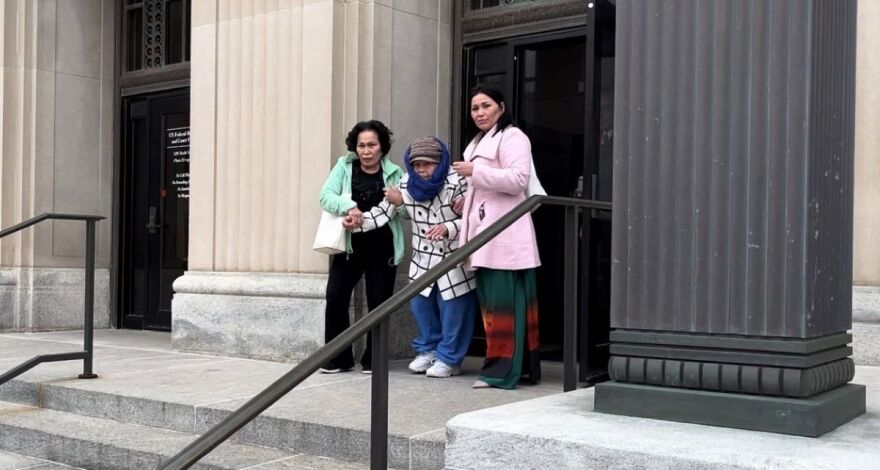A jury spent about five hours deliberating before convicting Kim Phuong Taylor on 52 counts of voter fraud in federal court Tuesday in Sioux City. Taylor faces up to five years in prison on each count. A sentencing date hasn’t been set.
Prosecutors say Taylor took advantage of other Vietnamese immigrants by illegally filling out election forms and ballots. Her husband, Jeremy Taylor, lost a GOP primary for the U.S. House and won election to the Woodbury County Board of Supervisors in 2020.

After the verdict, Taylor’s attorney, F. Montgomery Brown, said he respected the decision and "now is the time for empathy for a family that is suffering."
During closing arguments, the prosecution added the case was important because voter fraud jeopardizes the foundation of democracy in the United States and damages the public trust in the electoral process. They added that Kim Taylor has worked on campaigns since 2008 and knew the difference between right and wrong.
Kim Phuong Taylor was indicted in January on 26 counts of providing false information in registering and voting, three counts of fraudulent registration and 23 counts of fraudulent voting. She entered a not-guilty plea.
The case centered around two elections in 2020
Jeremy Taylor ran in the GOP congressional primary against former Rep. Steve King in June of 2020. He came in a distant third behind King and Randy Feenstra, who won the primary and was subsequently elected to the U.S. House for the 4th District. In November 2020, Taylor was elected to the Woodbury County Board of Supervisors by a margin of two thousand votes, or 5%. He still serves on the board today.
What did the defense say in this case?
During opening statements, Taylor’s defense attorney, F. Montgomery Brown, said the case comes down to a “bias virus” due to bad blood between Jeremy Taylor, who is a Republican, and the Woodbury County Auditor and Election Commissioner Pat Gill. Gill is the only Democrat who holds a public office in Woodbury County. He was the one who alerted authorities about the alleged fraud.
A few years ago, Jeremy Taylor resigned from the board of supervisorsafter a controversy surrounding his residency. Taylor owned two homes, including one outside his district. Gill ruled that Taylor lived outside of his district and revoked his voter registration.
The defense only called a few witnesses when presenting its case. This testimony included insight from three women who knew Taylor through her work as a hairstylist. They said she is a trustworthy person.
During closing arguments, the defense admitted Kim Taylor made mistakes, but the government did not show adequate evidence of a scheme, and getting-out-the-vote activities are upheld by First Amendment rights.

Election official testified in court
Gill testified early in the trial about how he discovered issues with absentee ballots and how some of the signatures and forms looked like they were filled out by the same person. Since the ballots were separated from the envelopes that people signed, it was impossible to tell who submitted the ballots.
During the general election, Gill said he was able to trace suspicious ballots. Gill also said he witnessed both Kim and Jeremy Taylor dropping ballots off at a drop box outside the Woodbury County Courthouse. He alerted the FBI, who then investigated.
The prosecution also said evidence showed Taylor’s voter forms had similar handwriting. They showed the jury several voting forms to try and prove their point.
Members of the Vietnamese community share their experiences
Two Iowa State students, Tam and Thien Doan, took the stand and said that when they tried to file absentee ballots in Ames, they discovered someone had already cast a ballot in their names. They are Democrats, but their votes supported all Republican candidates, including former President Donald Trump. They were able to get new ballots in time for the general election.
Their mother, Huong Nguyen, stated Kim Taylor called to see if she needed help voting and that Taylor completed the paperwork, and the mother signed the ballot. She says she didn’t know that completing ballot forms for her children was against the law. She testified that Taylor said it was OK to do so. During closing arguments, Assistant U.S. Attorney Ron Timmons said when the FBI contacted Nguyen, Kim Taylor “told her to lie” and to not tell her children what happened to their ballots.
Eighty-six-year-old Hai Nguyen of Sioux City, who helped U.S. troops during the Vietnam War, spent more than a decade in a prison in North Vietnam. He came to Sioux City in 1993. He said that Kim Taylor came to his home and took all election documents while her husband Jeremy waited in a car. Nguyen admitted to signing his own election documents. However, he testified the signatures of other people who lived in his home appeared to be signed by someone else.
Defense Attorney Brown said during opening statements Kim Taylor would help immigrants translate documents. But Nguyen said Taylor only showed up to assist with voting materials.
Mihn Pan Do Pham, a firefighter from the Des Moines area, testified he wasn’t even a resident of Iowa at the time election documents were filled out for him against his knowledge.
Other members of the Vietnamese community also took the stand.
Kim Taylor’s mother caused an issue surrounding the trial
Kim Taylor’s mother was in the courtroom during the duration of the trial. She was warned by Chief U.S. Judge Leonard Strand not to have contact with any of the witnesses after she was seen talking with witnesses during a break and told them that her daughter, Kim Taylor, was facing 200 years in prison if found guilty. The prosecution asked to have the mother removed from the courtroom. The judge didn’t do that, but he did say if the mother continued to talk to witnesses, she could face a contempt of court charge.
Who didn’t testify?
Court documents say Woodbury County Sheriff Chad Sheehan was going to testify about comments Jeremy Taylor made to him as Sheehan was running for sheriff in 2020. Sheehan says Taylor told him he had a “lock” on voting in the Vietnamese community, and for a campaign donation, he could secure 500 to 700 votes for the future sheriff. Even though Brown said Sheehan would appear during the trial, he did not, nor did former Woodbury County Supervisor Rocky DeWitt. Brown said Jeremy Taylor denied both men a raise.
Jeremy Taylor was called an unindicted coconspirator in court documents
IPR News reached out to retired Federal Judge Mark Bennett, who served as district judge of the United States District Court for the Northern District of Iowa, for the meaning behind an unindicted coconspirator. Bennett is now the director of the Institute for Justice Reform and Innovation at Drake University. Bennett, who did not comment on specifics of the Taylor trial, said that could mean a few different things when someone is named an unindicted coconspirator.
First, there could be a lack of sufficient evidence to charge someone with a crime. But there may be other reasons that are part of the prosecution’s strategy. Bennett says there is evidence that can be admitted under the coconspirator hearsay exception.
This hearsay exception could have come into play if Woodbury County Sheriff Chad Sheehan testified about comments he said were made by Jeremy Taylor.

The trial moved quickly
Testimony in the case played out quicker than expected. Judge Strand told the jury the trial could take a dozen days. But both sides rested after five days of court proceedings. The prosecution spent more than three days presenting its case, the defense about an hour. Kim Taylor did not take the stand.





